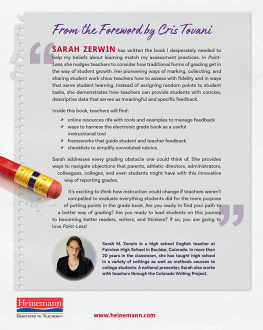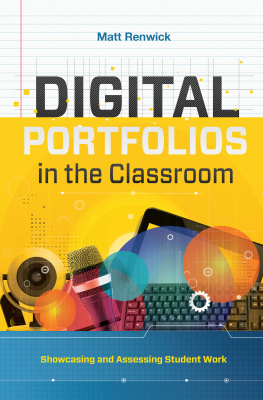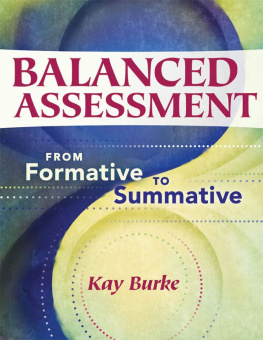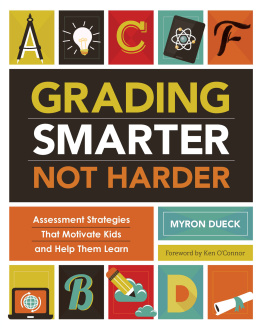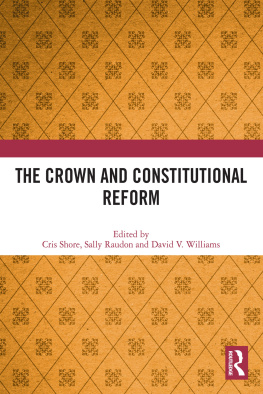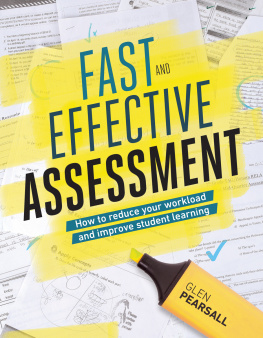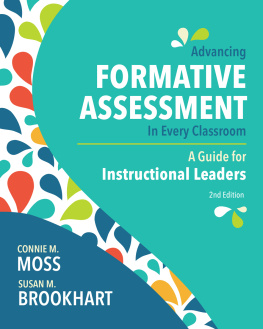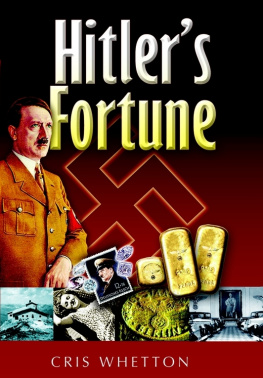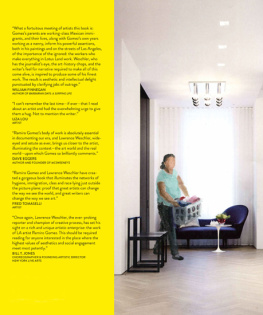So What Do They Really Know?
Assessment That Informs Teaching and Learning
Cris Tovani


Stenhouse Publishers
www.stenhouse.com
Pembroke Publishers
www.pembrokepublishers.com
Copyright 2011 by Cris Tovani
All rights reserved. Except for the pages in the appendix, which may be photocopied for classroom use, no part of this publication may be reproduced or transmitted in any form or by any means, electronic or mechanical, including photocopy, or any information storage and retrieval system, without permission from the publisher.
Every effort has been made to contact copyright holders and students for permission to reproduce borrowed material. We regret any oversights that may have occurred and will be pleased to rectify them in subsequent reprints of the work.
Credits
Page 75: Defiant Teenager Gets Jail Time in Vehicular Homicide, by Monte Whaley. Denver Post, September 8, 2004. Reprinted with permission.
Page 79: Separated from Family: With Parents Deported, San Eli Student Must Fend for Himself, by Aileen B. Flores. El Paso Times, September 21, 2010. Reprinted with permission.
Pages 91, 92: Excerpt from The Great Gatsby: Reprinted with the permission of Scribner, a Division of Simon & Schuster, Inc., from The Great Gatsby (Authorized Text) by F. Scott Fitzgerald. Copyright 1925 by Charles Scribners Sons. Copyright renewed 1953 by Frances Scott Fitzgerald Lanahan. All rights reserved.
Library of Congress Cataloging-in-Publication Data
Tovani, Cris.
So what do they really know? : assessment that informs teaching and learning / Cris Tovani.
p. cm.
Includes bibliographical references.
ISBN 978-1-57110-730-5 (pbk. : alk. paper)ISBN 978-1-57110-918-7 (e-book)
1. EducationEvaluation. 2. Educational tests and measurements. 3. Effective teaching. 4. Teacher-student relationships. 5. Academic achievement. I. Title.
LB1775.T68 2011
371.262dc22
2011011149
Cover design, interior design, and typesetting by Martha Drury
Manufactured in the United States of America

17 16 15 14 13 12 11 9 8 7 6 5 4 3 2 1
For Kenny, the middle of our center
Contents
Acknowledgments
I started this book five years agoabout the same time that my brother Kenny had received another diagnosis of melanoma. Kenny died May 1, 2009. A month after his death, I found myself making excuses to an editor that I just wasnt up to writing a foreword, as I had promised. I whimpered that my brother had just died and I was too upset to think clearly. The editor sympathetically told me she understoodand just like that, I was off the hook.
As soon as I hung up the phone, I had an overwhelming sensation of my brothers presence. Kenny was shaking his head and saying, Pull yourself together and quit blaming me for your writers block. Its time for you to get back to work on that book. And with that, I again started writing. Watching my brothers battle with cancer, and his determination to beat it, inspired me to keep writing. This was a tough book to finish because the field of assessment is changing daily. Every day teachers are faced with the challenge of equitably translating thinking into a grade. They also strive to use assessment in a way that informs their instruction. This book only begins to scratch the surface, and, like the other two books Ive written, I couldnt have done it without lots of help.
I thank Kenny for sitting on my shoulder and nudging me through the tough parts. This one is for you, buddy.
I thank my husband, Pete, for being there when I couldnt be. I love you. I also thank my daughter Caroline, who stood shoulder to shoulder with me during the most difficult time of my life. You are a lot stronger than you think, and I love you to pieces.
I thank my editor, Philippa, who possesses just the right amount of intuition to know when to push and when to encourage. Her wisdom and patience come in epic proportions. I am humbled and grateful that she lets me take credit for the many good ideas she sends my way.
And last but not least, I thank my friend Samantha Bennett. Without her hours of endless editing, I would still be bumbling around rewriting the same chapters over and over again. Years ago when Sam started facilitating labs in my classroom, I had no idea shed become my instructional coach and then my dear friend. Her brilliance pushes me every day to rethink what matters most for kids. She makes me laugh and reminds me to take time to smell the roses. Without her, Id still be grumpy and stuck.

CHAPTER 1
Assessment: It Doesnt Have to Be the Enemy
We use the general term assessment to refer to all those activities undertaken by teachersand by their students in assessing themselvesthat provide information to be used as feedback to modify teaching and learning activities. Such assessment becomes formative assessment when the evidence is actually used to adapt the teaching to meet student needs.
Paul Black and Dylan Wiliam (1998)
Never, in a million years, did I think I would write a book on assessment. But when No Child Left Behind (NCLB) hit its stride, the political tenor got to be too much for me. Its penchant for the business adage, You manage what you measure, had gone overboard. Instead of NCLB improving teaching and learning, it had morphed into a way to judge and rank kids and teachers.
Thankfully, my elementary roots reminded me why assessment was important in the first place. I realized that assessment wasnt the enemy; it was the way it was being used to judge and punish instead of inform and help educators get smarter about teaching and learning.
I began to examine my definition of assessment and embrace it in a way that would not only inform my instruction but also provide useful feedback to students. I knew there needed to be multiple pieces of evidence to tell me the stories of the learners in my room so that neither they nor I would ever be judged solely by a test score.
I dug into the reams of research on formative assessment and became intrigued with the thinking of Dylan Wiliam, Paul Black, Grant Wiggins, Jay McTighe, Lorna Earl, Robert Marzano, Susan Brookhart, Ken OConnor, Mike Schmoker, Rick Wormelli, and Rick Stiggins. I took some risks of my own and realized the possibilities of positive uses of assessment for my students. This book invites readers back into my classroom. But beware: you will not find tips, tricks, or an appendix of formative assessments. My hope is that teachers will recognize that many of the tools they already use, when given a slight tweak, can serve as powerful assessments that will inform instruction and improve achievement. Join me as we try to figure out, So, what do they really know?
Bombing a Test Doesnt Mean Youre Stupid
Ive never liked the word test. When I was a student, tests never reflected what I thought I knew. Sometimes Id get a high percentage correct when in my heart I knew I hadnt mastered the material. Other times when I was sure I knew the material, my score would be surprisingly low. I wondered how many of my students felt the same way.


